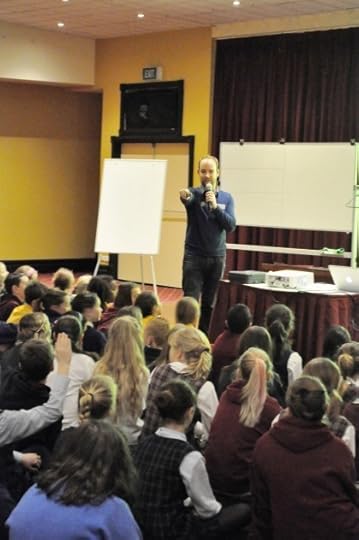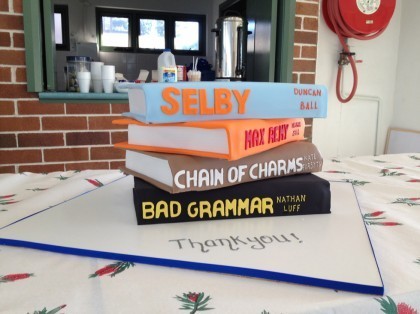Nathan Luff's Blog, page 8
August 15, 2013
Luff Out Loud
Just a quick note to say thank you to all the wonderful schools I have been visiting.
The students at St Brigid’s School in Coogee asked some of the most intelligent questions I have ever been asked. In Wollongong I ran a workshop on writing comedy (the workshop was called Luff Out Loud) This was organised through the Children’s Book Council of Australia (NSW – Illawarra Branch). There were lots of fabulous authors there and 150 kids who all love books. In my workshops we all created a story together. I thought I’d share the plot with you because it was so good:
So this girl’s house was flooded and she had to take her dog with her to dancing practice, which had been relocated to the swimming pool because the hall was being renovated. The problem was a bunch of dogs were using the pool for synchronised swimming lessons. The girl (who was really bad at drawing) joined with her friends and came up with a plan to get rid of their dogs. Their plan was to break into the aquarium, smash the glass tank and steal a shark (kicking it if it tried to bite them). They then built a catapult to send the shark to the swimming pool, unfortunately the girl’s drawing was so bad they designed the catapult wrong and it ended up flinging the shark to her flooded house where it made itself at home …
What a plot!!!!!! Check out me in action below, photo courtesy of the delightful Tania McCartney.

August 4, 2013
Author Rampage
Many of you will know August is the month when children’s authors come out of their hidey-holes and go on a talking spree.
Book Week this year is from the 17th – 23rd of August and we’ve just had Literacy and Numeracy Week. I’ve had the pleasure of already visiting Jannali East Primary School, Curran Public School and St John the Baptist School in Freshwater. Some of my favourite moments include:
After telling some highly entertaining stories about my childhood, the first question asked by one of students was, “Do you have any friends?”
At one of the schools the students had discovered that I have some pretty funky dance moves – apparently I have written this somewhere on this website. This is why you should be careful what you post online kids!!! They were really looking forward to some awesome dancing from me, perhaps even some spinning on my head. Instead they got, well, I don’t really want to talk about it …
And then I got my favourite question: “How did you get to be so funny?” Awwwwww, that’s more like it!! The answer is by practicing with my MANY friends. Yes that’s right, I have HEAPS of friends, and most of them are real.
Coming up …
On Wednesday of this week (7th August) I’ll be presenting a workshop entitled Luff Out Loud: The Serious Business of Writing Funny Things. This is for the Illawarra section of the Children’s Book Council of Australia (CBCA).
Also coming up is a school visits to St Brigid’s School in Coogee, where I’m hoping to read some of my new manuscript to an audience for the first time. Scary ….
If you see am author out and about, say hello because they don’t get out much and it’s good for them to be around people. Happy reading as always …
July 23, 2013
Killing Your Darlings
Most writers will have encountered this expression at some stage. For the uninitiated, it is from a William Faulkner quote in reference to writing.
So, what does it mean?
It can mean the death of a character – writers are strange people who often fall in love with their characters, so killing them off is really traumatic.
Often though, it means getting rid of the bits of your writing that you think are FANTASTIC because you have also fallen in love with them. Yes, writers not only fall in love with characters, they fall in love with sentences and phrases – they really are a strange group of people. These BRILLIANT bits of writing make a writer believe he or she is SMART and a GENIUS. Sometimes a writer will read these bits and afterwards give themselves a pat on the back. But, here is the sad thing, sometimes, these bits of writing are AWFUL. The writer has become blinded and this is why some darlings must die.
For me, in especial reference to comedy writing, Killing Your Darlings is the bit where I go through a manuscript and delete REALLY funny stuff and throw it in a discarded Word file (I can’t bear to throw it out). Why would I do such a thing? Is it because I don’t want my books to be too funny? Is it because I’m worried if my books are too funny that the reader will explode with laughter? Yes, yes it is. Actually, no, I lie. The reason I do it is because while these bits are potentially hilarious (surely I’m not blinded!!), they don’t progress the story, in fact they slow the story down and ruin the flow.
This is my usual process: if I’ve written something I think is funny, or if I fall in love with a description, I’ll try my hardest to include it while everything around it crumbles, changes and conforms. Then comes D-Day. On D-Day, which stands for Death to Darlings Day, I can no longer avoid it. I become ruthless. And on D-Day is when the manuscript, unencumbered, starts to come to life.
I mention this because D-Day is coming this weekend to my new manuscript. Be warned, there will be tears …
June 6, 2013
Cake and Roses
Well this last month has been HUGE. So many things happening. I’ve clearly run out of time to do regular blogging but rest assured I am alive and well.
Let me update you on some of the important things to have taken place.
Firstly there was a cake. An awesome book-cake (see below) made by the wonderful people at St Michael’s in Belfield, where the NSW branch of the CBCA held an author afternoon tea.

Secondly, there was a cake coma, as a result of eating too much cake (see above).
Next I started work as a creative producer at Powerhouse Youth Theatre. They do wonderful thing there. I also did my first few weeks of teaching experience as part of a Masters degree I’m completing. It was great fun, even if I had to teach maths and sport (two subjects I’m not really brilliant at). As a result of this experience I discovered a new sport, Croccer, which is a mix between cricket and soccer. You may not believe it but I’m amazing at it (when versing 12 year olds). I also taught the students origami, which is something I have always loved. I made these for my supervising teacher:

And then there was a busy day of visiting schools, organised by the lovely people at Walker Books. I went out to Plumpton Public School to talk about narrative writing, and then up to Pittwater House in Collaroy, where I had an excellent time telling stories and talking about writing. Thanks so much to the staff and students at those schools for welcoming me and buying so many books!!!
And that is the end up of my highlights update. Thank you for your attention.
As you were.
May 11, 2013
Tea, Authors & Lots of Cake
The NSW branch of the Children’s Book Council of Australia (CBCA) are up to it again with their Author Afternoon Teas.I shall be participating at one this Thursday, the 16th of May. It is taking place at St Michael’s School in Belfield, and I will be joining the following authors: Duncan Ball, Deborah Abela, and Kate Forsyth. It is an extremely intimidating line up.
It’s wonderful being able to share my love of books and writings, but let’s be honest, I’m mostly going because of the cake. Ooooh, I love cake.
If your school is ever interested in hosting an afternoon tea with authors, you can find out more information here: http://nsw.cbca.org.au/pages/author-teas.html
On another note, apologies for my slackness with blogging. Things are very hectic this year with work, study, writing, and an addition to the family expected in three to four months. Crazy times!
April 16, 2013
History Repeating Itself
I came across a great article by author David Mitchell regarding the writing of historical fiction.
I’m currently reading his excellent ‘The Thousand Autumns of Jacob De Zoet’ which is set in the late 1700s at the Dutch East India Trading Company’s factory port in Nagasaki Harbour, Japan. David Mitchell is fast becoming one of my favourite authors.
Writing historical fiction has always been something that has both intrigued and frightened me. History I find fascinating but the idea of being able to recreate a period authentically is the terrifying bit. While I am not currently writing in this genre, I do have one of two period pieces locked away in my head and this article I found to be a really helpful starting point. The article was first published by The Telegraph in London and you can read the entire article here.
One excellent point he writes is that when approaching historical fiction, the author obviously has to do a lot of research into the chosen era BUT when actually writing the book, all of this detail needs to be hidden and not made obvious (ie don’t leave it hanging around as a way of showing off just how learned you now are).
The historical novelist must learn how the vast gamut of human needs was met in the “destination period”: how were rooms lit and heated? How were meals prepared, clothes made, bodies bathed (or not), feet shod, distances covered, transgressions punished, illnesses explained, courtships conducted, contraception considered, divinities worshipped and corpses disposed of? The more Moleskines you fill with the fruits of research, however, the more determinedly it must be hidden: lines such as “Shall I bid Jenkins ready the Phaeton coach, or might Madam prefer the two-wheeled barouche landau?” will kill.
Another really interesting point David Mitchell makes is about language, including dialogue. The correct language of the time you are writing might reek of phoniness if you use it now, and it won’t resonate as much with readers. David Mitchell talks about ‘Bygonese’, a dialect which gives the authentic speak of the time a modern flavour.
And then you have to worry about language. Unless you have an entire historical novel made out of reported speech (easier to digest bubble pack) the characters must open their mouths at some point, and when they do, how are they going to speak? This is the “lest” versus “in case” dilemma: the sentence-joint “in case” (as in “eat now in case we don’t have time later”) smells of modern English, but a “correct” translation into Smollett’s English (“Eat on the nonce, My Boy, lest no later opportunity presents itself”) smacks of phoniness and pastiche if written in 2010. It smacks, in fact, of Blackadder, and only a masochist could stomach 500 pages. To a degree, the historical novelist must create a sort of dialect – I call it “Bygonese” – which is inaccurate but plausible. Like a coat of antique-effect varnish on a pine new dresser, it is both synthetic and the least-worst solution.
So there you go. Some food for thought from someone who has been there and done that, and done it remarkably well, I might add.
April 8, 2013
Engine Problems
I am back in the swing of writing (yay!!!!!! roar the fans). I am working on the second draft of a manuscript that I think has potential but is not working. I have had a look under the hood and I’m afraid it is a serious case of ENGINE FAILURE.
You may have heard many people talk about stories as having engines – basically I’m talking about the answer to the following questions:
Who is your story about?
What is his/her goal?
What is his/her need?
What are his/her flaws?
What are his/her strengths?
What is the big thing that will happens to set them off on a journey?
Once you have the answers to these questions, you have an engine. Just add some fuel (imagination) and you’re off and driving (much like this metaphor, which keeps giving and giving …)
Sound easy? It isn’t.
Even though I understand story, sometimes looking at the mess that is my story’s engine is more confusing than looking at a real car’s engine. Just to be clear, when I look at a real car engine I can pretty much only identify the oil checkerer thingamejib and the dead insect collecting tray (though I’m pretty sure that is not what the tray is there for).
The story’s engine is usually set up in the first few chapters of a novel. When I get the engine wrong (which I usually do in the first few drafts) then my story stumbles through the many chapters to follow, often arriving at a wrong destination. However, when I get the engine right, everything clicks into gear and I speed on through the rest of the writing process. It’s a wonderful feeling, the figurative wind blowing through what is left of my hair … wow, this metaphor could not have worked better.
Tips on how to fix your story’s engine by Mechanic Luff
Bang your head against an empty notebook. If you do it enough times, the story’s engine might magically appear on the page.
Moan. Moan some more. Call friends and moan to them. Tell loved ones that you are ‘giving up all this writing nonsense and getting a sensible job’.
Procrastinate by writing a blog post
Go to a second hand store. Buy a book that has been out of print for decades. Steal the story engine and laugh maniacally as you rush back home and install it into your own story.
Well, as always, I’m sure this has been helpful and informative.
Yours in frustration,
Me.
April 3, 2013
Thank you Guise Public School
I had the pleasure of visiting the students at Guise Public School today. They were receiving their term one free books thanks to Books in Homes and the University of Western Sydney. Even though I didn’t get any free books I still got excited for the kids who all did.
Maybe I’ll go to the shops now and buy myself some books, then I’ll bang my head against the wall so that I lose my short term memory and it will be like I’m receiving free books. Actually, I might not do that – there is a chance it might hurt.
Things I learned from the students at Guise Public School:
Penguins are scary (right up there with tigers, snakes and crocodiles, apparently)
All horses are not evil (despite my experience that they are)
Ice cream is better than chocolate (even though I don’t believe this for a second)
Thanks for making me welcome and enjoy your books!!!!!!!!! Let your imaginations run wild.
March 25, 2013
Public Holiday Ideas
A couple of public holidays are fast approaching. I know a lot of you look to me for life advice, so I thought I’d prepare a guide of ways to spice up your public holiday. The thing to remember is that public holidays don’t happen that often, so you’ve really got to make them unique days.
Ways to spice up your public holiday
Wake everyone in your house super early – people like to sleep in on days off, which is ridiculous because you waste too much of the day. If people are resistant, cover them with dirty laundry until they get up.
Have something unusual for breakfast to remind you that this is not a normal day. Some suggestions are: ice-cream, baby food (if you’re not a baby), or Brussels sprouts in jelly syrup.
Wear the clothes from your wardrobe that you never wear (for whatever reason) – this will be like a reverse public holiday for them, ie the one day they have to work.
Change your name for the day. Anyone who calls you by your normal name has to give you 5c each time they do it.
Buy Bad Grammar or Chicken Stu by Nathan Luff. Read it. Read it again. Go back to the shop and buy copies for ALL your friends and relatives.
Take the supermarket aisle challenge – this is where you choose one aisle only in which to get all the ingredients to cook a meal (pre-packaged meals are not allowed) and you only have 30 seconds in which to do so. From experience I can tell you the pet food aisle is not a good choice.
Open the dictionary at random and point to any word on the page. You now have to try using that word as many times as you can (correctly) in conversation during the day. Tip, avoid opening the dictionary towards the end letters.
Read Bad Grammar again. And again.
I hope some of these tips help. Happy public holidaying everyone. Make the most of it!! Myself, I’ll be in Byron Bay stalking Paul Simon.
March 20, 2013
Cheap Kids Books Today (21 March)
Just a reminder that the annual Children’s Book Council of Australia (NSW Branch) booksale is taking place today.
I’ve been for myself the past couple of years (though I pretended I worked for a library so no one would think it strange that I was buying all of these kids books purely for me to read, not that there is anything wrong with that). And this year I will be there again, along with the wonderful Pamela Freeman, and Tony Flowers, this time signing some books and greeting the lovely people who attend. The non lovely people who attend, I will growl at.
So, come along because not only do you get awesome cheap books but it supports the CBCA (NSW) and they do all sorts of fantastic things all in the name of children’s literature.
Details:
NSW Writers’ Centre, Callan Park, Balmain
3-6pm



